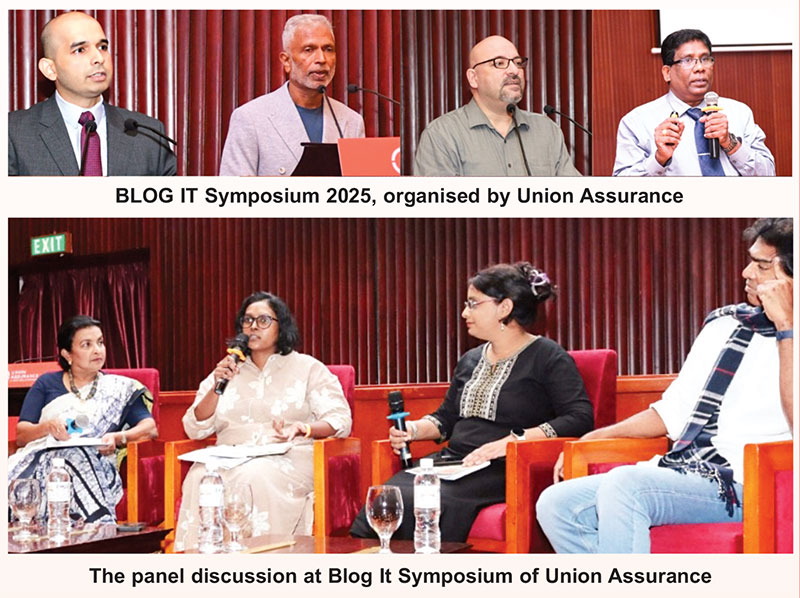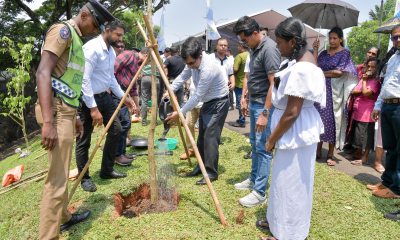Business
CBSL maintains policy interest rates at current levels

Extracts of Monetary Policy Review: No.07 – Oct. 2021
The Monetary Board of the Central Bank of Sri Lanka, at its meeting held on 13 October 2021, decided to maintain the Standing Deposit Facility Rate (SDFR) and the Standing Lending Facility Rate (SLFR) of the Central Bank at their current levels of 5.00 per cent and 6.00 per cent, respectively. The Board arrived at this decision after carefully considering the macroeconomic conditions and expected developments on the domestic and global fronts. The Board reiterated its commitment to maintaining inflation at the targeted levels over the medium term with appropriate measures, while supporting the economy to reach its potential in the period ahead.
The global economic recovery is expected to continue despite large disparities across countries. As per the World Economic Outlook (WEO) of the International Monetary Fund (IMF) released on 12 October 2021, the global economy is projected to grow by 5.9 per cent in 2021 and 4.9 per cent in 2022. Economic prospects remain divergent across countries, mainly due to disparities in access to COVID-19 vaccines and policy support. Consumer price inflation in most countries increased significantly, reflecting the impact of pandemic related supply-demand mismatches and the surge in commodity prices, compared to their low base from a year ago.
The Sri Lankan economy is making headway, despite the pandemic related disruptions As per the estimates of the Department of Census and Statistics (DCS), the Sri Lankan economy witnessed a strong recovery during the second quarter of 2021, recording a real growth of 12.3 per cent, year-on-year, following the growth of 4.3 per cent, year-on-year, in the first quarter of 2021. With the gradual return to normalcy after phasing out the COVID-19 related lockdown measures, alongside the successful rolling out of the COVID-19 vaccination programme and growth supportive policy measures, the momentum of economic activity is expected to sustain in the period ahead. Available indicators and projections suggest that the real economy would grow by around 5 per cent in 2021, and gradually traverse to a high and sustained growth trajectory over the medium term, following near-term stabilisation measures that are being put in place by the Government and the Central Bank. The planned coordinated efforts by the Government and the Central Bank are expected to strengthen the external sector in the period ahead Earnings from exports marked a notable improvement and recorded over US dollars 1 billion for the third consecutive month in August 2021. Expenditure on imports has also increased, partly reflecting the surge in global commodity prices, resulting in an expansion in the trade deficit during the eight months ending August 2021, over the corresponding period of last year. Outlook for tourism improved
with the easing of travel restrictions globally and the successful vaccination drive domestically. Despite the moderation of workers’ remittances observed in recent months, a rebound is expected in the period ahead with the improved growth outlook for major foreign employment source countries and greater stability in the domestic foreign exchange market. The realisation of foreign investments in the real sector and the timely adoption of remedial measures by the Central Bank as enunciated in ‘The Six-month Road Map for Ensuring Macroeconomic and Financial System Stability’ are gradually easing pressures in the domestic foreign exchange market. Furthermore, the Central Bank continued to intervene in the foreign exchange market to provide liquidity for essential imports, including fuel. The depreciation of the Sri Lankan rupee against the US dollar is recorded at 6.8 per cent thus far in 2021. The Sri Lankan rupee remains largely undervalued as reflected by the real effective exchange rate (REER) indices. In the meantime, gross official reserves were estimated at US dollars 2.6 billion by end September 2021. This, however, does not include the bilateral currency swap facility with the People’s Bank of China (PBoC) of CNY 10 billion (equivalent to approximately US dollars 1.5 billion). Gross official reserves are expected to improve with the measures that are being pursued by the Government and the Central Bank to attract fresh foreign exchange inflows, as outlined in the Six-month Road Map, thereby reinforcing the stability of the external sector in the period ahead. Market interest rates have adjusted upwards in response to the tightening of monetary and liquidity conditions, while credit and monetary expansion remained elevated In response to the tightening of monetary policy in August 2021, most market deposit and lending rates have adjusted upwards. Further, yields on government securities witnessed a sharp upward adjustment with the removal of maximum yield rates for acceptance at primary auctions. Following these upward adjustments, greater stability is expected in market interest rates in the period ahead. Reflecting the increased demand for credit amidst the low interest rate environment, credit extended to the private sector expanded as envisaged during the eight months ending August 2021. The momentum of credit expansion is expected to continue during the remainder of the year, with the recovery in economic activity and continued efforts to channel credit flows to productive and needy sectors of the economy.
Meanwhile, credit obtained by the public sector from the banking system, particularly net credit to the Government, also increased notably during the eight months ending August 2021. With increased domestic credit, the growth of broad money (M2b) continued to remain elevated. Some inflationary pressures are observed, particularly due to emerging global price developments Inflation accelerated in recent months due to high food inflation and some acceleration in non-food inflation. The surge in global commodity prices prompted the Government to remove maximum retail prices on several essential commodities. Along with resultant upward adjustments in other market prices, this is likely to cause headline inflation to deviate somewhat from the targeted levels in the near term. While such supply side developments in the near term do not warrant monetary policy tightening, measures already taken by the Central Bank in relation to interest rates and market liquidity would help stabilise demand pressures over the medium term.
Business
Russell’s Tea partners with Sri Lanka’s indigenous community

Allocates 4% of global sales for their socio-economic empowerment
Sri Lankan tea exporter Russell’s Tea (Pvt) Ltd achieved a historic milestone by signing a Memorandum of Understanding (MOU) to allocate 4% of its international sales revenue from ‘Russell’s Ceylon Ancestral Herbal Infusions’ toward the sustainable development of Sri Lanka’s indigenous community.
The company simultaneously launched five premium tea ranges—Ceylon Health and Wellness Teas, Ceylon Ancestral Herbal Infusions, Ceylon Fine Teas, Ceylon Organic Specialty Teas, and Ceylon Artisan Teas—to the global market, beginning with the UAE.
The MOU, formalizing the 4% revenue pledge, was signed by Russell’s Tea Director Jehan Perera and Vedda leader Uruwarige Wannila Aththo during a ceremony at Colombo’s Amari Hotel on Saturday. This agreement marks the first time the indigenous community will receive dollar-denominated compensation for sharing their ancestral knowledge of herbal remedies, which contributed to the development of Russell’s Ceylon Ancestral Herbal Infusions.
“Our R&D team drew significant inspiration from the Vedda community’s traditional wisdom on natural health benefits,” said Jehan Perera. “We believe it is our responsibility to reciprocate by supporting their socio-economic growth through this initiative.”
He added that the company plans to export the Community’s goods like wild honey in the future, further integrating the community into global markets.
Russell’s Tea has already secured partnerships with major UAE retailers, including the Lulu supermarket chain, with plans to expand across Gulf Cooperation Council (GCC) countries and Europe. All products, targeting luxury and tourism sectors, will be available in leading supermarkets by late June.
Celebrating its 38th anniversary, Russell’s Tea founder Russell Perera reflected on the company’s evolution: “From pioneering Sri Lanka’s corporate outdoor catering service to becoming a forex-earning exporter, this global launch symbolizes our commitment to innovation and national progress,” he said.
By Hiran Senewiratne
Business
Shyam takes helm at Sunshine Holdings as nephew succeeds uncle Vish in leadership transition

Under a Colombo sunset at the Taj Samudra, laughter, applause, and celebratory toasts recently marked the farewell of Vish Govindasamy, who stepped down from his executive role at Sunshine Holdings PLC after 28 years of transformative leadership.
The event, attended by business leaders, Sunshine’s senior team, and industry stakeholders, honoured his legacy as he transitioned to the Non-Executive Deputy Chairman role, while his nephew, Shyam Sathasivam, assumed the Group CEO position—a testament to the family bond steering this corporate evolution.
Sunshine Holdings announced that Govindasamy would continue in advisory capacity to ensure strategic continuity.
Govindasamy’s tenure which began in 1997 as CEO of Watawala Plantations, saw the Group expand into healthcare, consumer goods, renewable energy and dairy, while launching iconic brands such as Zesta, Watawala Tea, and Ran Kahata as well as Healthguard Pharmacy. Under his stewardship, Sunshine forged partnerships with global giants such as Wilmar and SBI Japan, earned recognition among Asia’s Best Workplaces, and championed social impact through the Sunshine Foundation for Good.
Shyam Sathasivam, Govindasamy’s nephew and successor, joined Sunshine in 2005 and has been integral to its recent growth. Having collaborated closely with his uncle for nearly two decades, Shyam emphasised his commitment to upholding the Group’s purpose-driven ethos: “Mr. Govindasamy nurtured a vision that blends business with heart. I am honored to build on this legacy, ensuring we continue to care for all stakeholders,” he stated at the farewell event.
During his address, Govindasamy observed attendees dispersed across the room and humorously underscored his attention to detail by remarking, “I kindly request everyone to assemble closer to the stage—such nuances catch my eye, a testament to my micro-management tendencies.” The lighthearted comment drew laughter while reflecting his reputed dedication to organizational precision.
Then shifting to the matter at hand and reflecting on his journey, Govindasamy acknowledged the Group’s resilience through Sri Lanka’s civil war and economic crises, expressing confidence in his nephew’s leadership: “Sunshine’s future is bright under Shyam. Our shared values and his forward-thinking approach will drive new heights,” he said.
The transition underscores a unique fusion of family trust and corporate strategy, positioning Sunshine Holdings for its next chapter.
By Sanath Nanayakkare
Business
Union Assurance is redefining financial literacy in Sri Lanka

‘Blog It Symposium’
The ‘Blog It Symposium’ hosted by Union Assurance on March 27 at the BMICH, had drawn writers, students and professionals alongside literary giants like Ashok Ferrey. The event was less a corporate gathering and more a cultural movement, symbolising a quiet revolution in Sri Lanka’s journey toward financial empowerment.
Financial literacy, often confined to jargon-filled pamphlets or intimidating technical writeups, has found an unexpected ally in storytelling with Union Assurance’s Blog It initiative, launched years prior, which recognises a universal truth: people connect with stories, not statistics. By inviting bloggers and writers to explore themes like life insurance, savings, and generational wealth through personal narratives, the initiative transforms complex concepts into relatable tales. A mother’s account of securing her child’s education amid economic uncertainty, a young entrepreneur’s journey from debt to stability, or a retiree’s challenges in the rest of his or her life were the seeds of stories that resonated deeply with the writers in the audience especially because they are writing for a society whose financial planning is often overshadowed by day-to-day struggles.
Ashok Ferrey, the keynote speaker asked the audience,” Why do we write? “We write,” he suggested, “to express ourselves in ways that evade the rigid pathways of ordinary consciousness.” Imagine, he said, slipping into a disguise to go to a fancy dress party; that lets you be someone else. Writing, in Ferrey’s vision, operates similarly—it is a costume party for the psyche. “When we write, we shed the constraints of our daylight selves. The keyboard or pen becomes a mirror that reflects not who we are, but who we might invent,” he said.
“These aren’t just blogs,” remarked Lal Medawattegedara, novelist and symposium panelist. “They’re survival guides written in the language of the people.”
Rather than lecturing, Union Assurance has created a platform for dialogue. Winning entries, published in newspapers and shared across social media, turns anonymous writers into local influencers. A gem merchant from Ratnapura, whose blog on gem buying and selling would go viral, encouraging young people in the area to follow suit. A Colombo college student’s poem about her family’s medical debt would inspire a community savings drive. “Financial literacy isn’t about telling people what to do,” said Union Assurance CMO Mahen Gunarathna. “It’s about giving them the tools to write their own futures.”
As the 2025 symposium concluded, the message was clear: financial literacy is not a solo journey but a shared narrative.
In a world where money talks, Union Assurance has mastered a profound lesson: sometimes, the most powerful currency is a story well told. Sri Lankans are not just learning about finances—they’re rewriting their financial destinies with the support of Union Assurance.
By Sanath Nanayakkare
-

 Foreign News7 days ago
Foreign News7 days agoBuddhism’s holiest site erupts in protests over Hindu ‘control’ of shrine
-

 Features5 days ago
Features5 days agoCelebrating 25 Years of Excellence: The Silver Jubilee of SLIIT – PART I
-

 Sports1 day ago
Sports1 day agoSri Lanka’s eternal search for the elusive all-rounder
-

 Business3 days ago
Business3 days agoAIA Higher Education Scholarships Programme celebrating 30-year journey
-

 Business5 days ago
Business5 days agoCEB calls for proposals to develop two 50MW wind farm facilities in Mullikulam
-

 Features5 days ago
Features5 days agoNotes from AKD’s Textbook
-

 News2 days ago
News2 days agoGnanasara Thera urged to reveal masterminds behind Easter Sunday terror attacks
-

 News1 day ago
News1 day agoComBank crowned Global Finance Best SME Bank in Sri Lanka for 3rd successive year




















